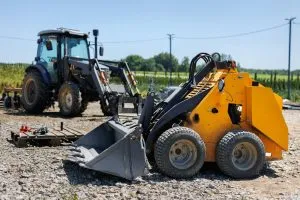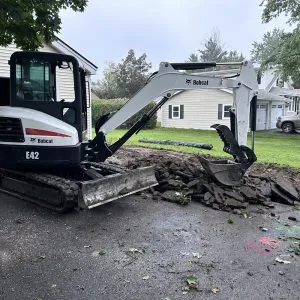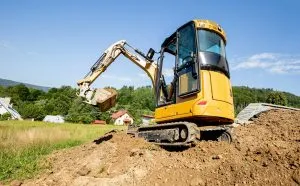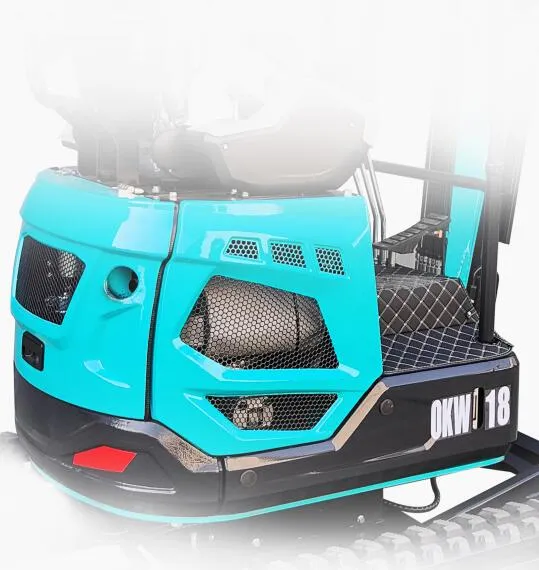Introduction
Purchasing mini excavators from China can be a cost-effective and efficient way to enhance your construction equipment fleet. As a global manufacturing powerhouse, China offers a wide range of options, competitive pricing, and advancements in technology. However, navigating the complexities of international trade, language barriers, and quality control can be challenging. This comprehensive guide will walk you through every step of the process, ensuring a smooth and successful purchase.

Understanding Mini Excavators
What are Mini Excavators?
Mini excavators, also known as compact excavators, are versatile pieces of construction equipment designed for small to medium-sized tasks. They typically weigh between 1 to 10 tons and are used for various applications such as digging, trenching, landscaping, and demolition.
Benefits of Mini Excavators
- Compact Size: Ideal for confined spaces.
- Versatility: Can be equipped with various attachments.
- Ease of Transport: Can be easily moved between job sites.
- Cost-Effective: Lower operating and maintenance costs compared to larger excavators.
Common Applications
- Urban Construction: Navigating tight spaces in city environments.
- Landscaping: Perfect for residential projects.
- Agriculture: Digging trenches for irrigation or laying foundations for small structures.
- Utility Work: Excavating for utility lines and maintenance.

Why Purchase Mini Excavators from China?
Cost Advantages
China’s manufacturing industry benefits from economies of scale, lower labor costs, and efficient production processes, which translate to competitive pricing for mini excavators.
Variety and Innovation
Chinese manufacturers offer a broad range of mini excavator models with various features and technological advancements, allowing buyers to find equipment that precisely meets their needs.
Customization Options
Many Chinese manufacturers provide customization options, enabling buyers to tailor the equipment to specific requirements.
Quality Improvements
Over the years, Chinese manufacturing quality has significantly improved, with many companies adhering to international standards and certifications.
Researching Chinese Manufacturers
Identifying Reputable Manufacturers
- Industry Directories: Use platforms like Alibaba, Made-in-China, and Global Sources.
- Trade Shows: Attend international trade fairs such as Bauma China.
- Referrals: Seek recommendations from industry contacts.
Evaluating Manufacturer Credibility
- Certifications: Look for ISO certifications and other industry-specific standards.
- Production Capacity: Assess their ability to meet your order size and timelines.
- Customer Reviews: Check feedback from previous buyers for insights into reliability and quality.
Key Manufacturers to Consider
- XCMG: Known for a wide range of construction machinery.
- SANY: Offers robust mini excavators with innovative features.
- LiuGong: Provides reliable and cost-effective equipment.
- Shandong Lingong (SDLG): Specializes in compact machinery.
- Nicosail: Specializes in 1-3 ton mini excavators.

Understanding the Import Process
Import Regulations and Compliance
- Tariffs and Duties: Research applicable import tariffs and duties for mini excavators.
- Compliance Standards: Ensure the equipment meets local regulations and safety standards.
- Import Licenses: Verify if an import license is required in your country.
Shipping and Logistics
- Incoterms: Familiarize yourself with International Commercial Terms (Incoterms) to understand responsibilities and costs.
- Freight Forwarders: Consider hiring a freight forwarder to handle shipping logistics.
- Shipping Methods: Choose between Full Container Load (FCL) or Less than Container Load (LCL) based on your order size.
Documentation Requirements
- Commercial Invoice: Must include details of the transaction.
- Bill of Lading: A document issued by the carrier.
- Certificate of Origin: Verifies the country of manufacture.
- Insurance Certificate: Ensures coverage during transit.

Making the Purchase
Requesting Quotes and Proposals
- Detailed Inquiry: Provide comprehensive details about your requirements.
- Multiple Quotes: Request quotes from several manufacturers for comparison.
- Negotiation: Don’t hesitate to negotiate terms, prices, and payment conditions.
Evaluating Offers
- Price vs. Value: Assess the total cost, including shipping, duties, and any additional fees.
- Warranty and Support: Consider the terms of warranty and after-sales support.
- Lead Time: Ensure the delivery timeline aligns with your project schedule.
Payment Terms
- Letter of Credit (LC): A secure payment method minimizing risk for both parties.
- Telegraphic Transfer (T/T): Commonly used for international transactions.
- Escrow Services: Provides a layer of security by holding funds until the transaction is completed satisfactorily.

Inspecting and Testing the Equipment
Pre-Shipment Inspection
- Third-Party Inspection: Hire an independent inspector to verify quality and compliance.
- Factory Visit: If feasible, visit the manufacturer’s facility to conduct a hands-on inspection.
Testing the Mini Excavator
- Operational Test: Ensure the machine operates smoothly under various conditions.
- Attachment Compatibility: Verify that all attachments function properly.
- Performance Metrics: Check for specifications like digging depth, reach, and fuel efficiency.

Shipping and Receiving the Equipment
Packaging and Handling
- Secure Packaging: Ensure the mini excavator is adequately protected during transit.
- Handling Instructions: Provide clear handling instructions to avoid damage.
Customs Clearance
- Documentation: Ensure all necessary documents are prepared and submitted.
- Customs Broker: Consider hiring a customs broker to facilitate the process.
Receiving and Unpacking
- Inspection: Conduct a thorough inspection upon arrival for any damage or discrepancies.
- Documentation: Verify that all paperwork matches the received equipment.
Maintaining Your Mini Excavator
Routine Maintenance
- Daily Checks: Inspect fluid levels, tires, and controls.
- Scheduled Servicing: Adhere to the manufacturer’s recommended maintenance schedule.
- Replacement Parts: Keep a stock of common replacement parts.
Troubleshooting Common Issues
- Engine Problems: Diagnose and address starting issues or abnormal noises.
- Hydraulic System: Check for leaks and ensure proper pressure levels.
- Electrical System: Inspect wiring and battery connections regularly.
Extending Equipment Lifespan
- Proper Storage: Store the mini excavator in a sheltered location.
- Training Operators: Ensure operators are trained on proper usage and maintenance.
- Regular Updates: Keep software and firmware updated if applicable.
FAQs
What are the primary uses of mini excavators? Mini excavators are used for digging, trenching, landscaping, demolition, and utility work, particularly in confined spaces.
How can I ensure the quality of a mini excavator purchased from China? Conduct thorough research on manufacturers, request third-party inspections, and consider factory visits to ensure quality.
What are the common shipping methods for mini excavators from China? Mini excavators are typically shipped via Full Container Load (FCL) or Less than Container Load (LCL) based on the order size.
What payment methods are safest for purchasing mini excavators internationally? Letters of Credit (LC) and Telegraphic Transfers (T/T) are commonly used and considered secure for international transactions.
How do I handle customs clearance for importing mini excavators? Ensure all necessary documents are prepared, and consider hiring a customs broker to facilitate the clearance process.
What should I do if the mini excavator arrives damaged? Conduct a thorough inspection upon arrival and document any damage. Contact the manufacturer and shipping company to resolve the issue promptly.
Conclusion
Purchasing mini excavators from China can be a strategic move for expanding your construction equipment arsenal. By understanding the process, researching reputable manufacturers, ensuring quality control, and managing logistics effectively, you can make a successful and cost-efficient purchase. This guide provides a detailed roadmap to help you navigate the complexities of international trade and secure high-quality equipment that meets your needs.






